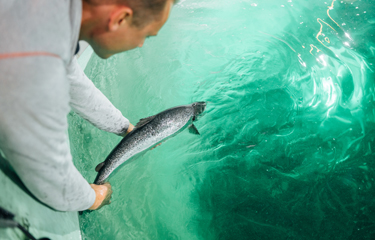On Tuesday, 23 March, Atlantic Sapphire suffered a mass mortality event at its recirculating aquaculture system salmon farm in Miami, Florida, U.S.A.
In a press release issued via the Euronext Market, where the company’s stock is listed, Atlantic Sapphire said it expected a loss of 500 metric tons (MT), or around 1.1 million pounds, of head-on, gutted salmon. The company said the average weight of the deceased fish was one kilogram, or 2.2 pounds, meaning an estimated 500,000 individual salmon died due to the accident. The total represents around 5 percent of its phase-one harvest volumes.
According to the company, an initial analysis has indicated a flaw in the design of the RAS caused “significant amounts of particles to flow from the drum filters (particle filtration systems) into the biofilters and trickling filters.”
“This resulted in elevated turbidity and possibly gases, and caused abnormal fish behavior. Fish gathered at the bottom of the tanks, disrupting the flow of new water, causing increasing mortality,” Atlantic Sapphire wrote. It said the analysis was preliminary and remains subject to change.
This is the second mass-mortality event Atlantic Sapphire has experienced at its Miami RAS facility. The company was forced to initiate an emergency harvest of an estimated 200,000 salmon weighing a collective 400 MT in July 2020, which it blamed on “disruptive construction work close to the operating environment, including loud sounds and severe vibrations,” stressing the fish.
And in February 2020, around 227,000 of its salmon died at its pilot farm in Denmark, likely as a result of exposure to high saturated nitrogen levels.
From those previous incidents, Atlantic Sapphire “identified an opportunity to ensure undisrupted water flow by modifying the center drain design in all of its grow-out tanks,” according to the press release.
“This work had already started prior to this incident [but] the center drain in the affected system had not yet been modified. Keeping an undisrupted water flow is critical to the operation of a RAS system,” it said. “As earlier communicated, the company is in the process of splitting its U.S. phase one grow out systems in half in order to reduce the impact of a potential incident. Currently, four out of six systems have been split. The splitting of the affected system has not yet been completed.”
Atlantic Sapphire said its other systems in the Miami RAS were unaffected.
“The incident comes in addition to the temporary challenges due to maturation and contractor workmanship but will not affect the continuity of supply to customers,” it said.
Atlantic Sapphire finished construction at the first phase of its Miami, facility in January and projected it would harvest 10,000 metric tons of salmon annually once commercial harvests commenced, expected in September 2020.
The company’s stock price dropped 2.4 percent on Wednesday, 24 March, and more than 11.5 percent from its closing price of NOK 138 (USD 16.08, EUR 13.60) on Tuesday, 23 March, to settle at NOK 122 (USD 14.22, EUR 12.02) at the end of trading on 24 March.
Photo courtesy of Atlantic Sapphire







